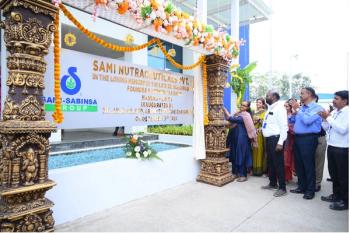
- Nutritional Outlook Vol. 25 No. 1
- Volume 25
- Issue 1
Nutraceutical equipment in 2022: Automated and smart
The most in-demand equipment going forward will streamline manufacturing and solve some of the biggest problems facing the market today: labor shortages, data mining, and efficiency.
There was once a time when nutraceuticals were made on one type of equipment and pharmaceuticals were made on another (superior) type of equipment. Those days are gone. “With nutraceutical new product development being reshaped by all-time high levels of consumer health consciousness, many companies are turning to the pharma industry to help them deliver more effective nutritional supplements,” says Marcus Michel, CEO of ACG Engineering (Piscataway, NJ). “Deliveries commonly used within pharmaceutical products are now increasingly adopted by nutraceutical companies to provide more unique products, improve efficacy, and differentiate products.”
But as demand rises for nutritional supplements, formulators are looking for equipment that can not only produce top-of-the-line products but also make their day-to-day operations run more smoothly and efficiently.
One trend on the radar for 2022 is equipment that is easy to use and clean. “Buyers are looking for efficiency, batch-to-batch consistency, easy cleaning, and simple maintenance,” says Christine Banaszek, application engineer and sales manager for Charles Ross & Son Company, a Hauppauge, NY–based manufacturer of specialty mixing and blending equipment. Banaszek says these objectives can be met with high polish on stainless steel surfaces, interchangeable mix vessels, sanitary fittings and valves that can be quickly taken apart for thorough cleaning, drain ports, large enough access to agitators, and other approaches.
“The COVID-19 pandemic has caused increased demand in the dietary supplement space, and many manufacturers are working to increase production volume,” says Frederick Murray, president of KORSCH America Inc. (South Easton, MA). “In many cases, this increased demand can be offset to a large extent through improved efficiency, which means faster changeovers and increased uptime.” The new KORSCH XL 400 4 Tablet Press offers an integrated electrical cabinet, an advanced torque drive, and a fully sealed design, with the capability to produce single-layer, bi-layer, and tri-layer tablet formats on the same machine platform. “The result is a smaller footprint,” says Murray, “delivering powerful performance, an extremely fast change capability, as well as a flexible platform to accommodate all product formats on the same machine.”
At Volkmann USA (Bristol, PA), Vice President of Sales and Marketing David Nichols agrees that the capability to produce multiple products on the same system is a huge plus. “Stainless steel is a given, and it needs to be able to disassemble quickly with no tools,” he adds. At I Holland (Nottingham, England), an ultrasonic cleaner is attractive because it can quickly and easily remove contaminants like granule residue or grease from every surface, including those on tablet punches, dies, drip cups, and bellows.
But as ACG’s Michel points out, equipment is a long-term investment, and companies must be confident that it’s able to meet current needs as well as any future trends; in other words, it must be able to grow and evolve with the market. “What this means in 2022 is that companies should be looking to invest in equipment that makes their factories flexible, agile, and, ultimately, smarter,” he says.
Smart Machines
By “smarter,” Michel means that machinery must be equipped with data analytics and machine learning, as these can lower manufacturing costs, improve quality, and reduce capacity constraints. “Big data, artificial intelligence, cloud computing, continuous connectivity, and advanced analytics are some of the most in-demand features across all types of equipment,” he explains. “These features help the industry respond to issues such as rising supply chain complexities and costs, the need for remote connectivity, and ever-changing industry and country regulations.”
Specifically, predictive analytics can help manufacturers draw on data to manage resource consumption, machine performance, and storage conditions on shop floors; to troubleshoot problems; optimize processes; and boost productivity. Augmented and virtual reality services can enable more operations to become remote—which is increasingly attractive in the era of COVID—with remote machine maintenance, installation, and commissioning.
ACG recently launched a new Smart Connected Adaptor Kit, which connects production machines at any facility and visualizes relevant information on a single platform. “Using the Smart Connected Adaptor, authorized users can monitor production on any internet-enabled device,” Michel says. “This means that nutraceutical companies can remotely monitor machine settings, performance parameters, downtimes, and alarms in one dashboard, all in real time, giving greater visibility and control to manufacturers.”
At I Holland, tool management systems are in demand, since they can register a factory’s entire tooling and largely automate the visibility of what is happening with the tools. “Its main objective is to establish compliant, efficient, and accurate maintenance of punches and dies, and to ensure that tooling is never a cause for delay in the production schedule,” says Marketing Coordinator Marianna D’Onghia. Plus, an in-depth monitoring system should be able to keep track of maintenance history and tooling inventory, support regulatory procedures, and comply with legal requirements in nutraceutical production. “The data can also provide information to effectively measure areas of performance by way of showing what and how many products have been produced, and a summary of any production issues experienced,” she adds. “Problems like wear to punch heads and tips can be detected before they impact production.”
Automated Is Here to Stay
Before machines became smart, they were automated. And while automation isn’t anything new, it’s hotter than ever as labor issues affect every industry, nutraceuticals included. “Many owners and managers are looking to automate as many steps in the production process as possible,” says Nichols. Volkmann’s PPC pneumatic vacuum conveying system automatically transfers ingredients within a sealed, enclosed system to prevent contamination, promote product purity, and support product efficacy. “Volkmann pneumatic vacuum conveyors automate the transfer of powders from storage, bulk bags, or sacks directly into a mixer or into any step in the process,” says Nichols, adding that they can also be used to transfer finished tablets directly from the press to the filling line or into storage.
“Automated equipment is in demand since it helps solve labor, safety, and product quality issues,” agrees John Deitz, president of Deitz Company (Wall, NJ). “Our bestselling machines for dietary supplements are our Pharmafill NB1 neck banding machine, which automatically applies tamper-evident shrink bands onto bottles and other containers, and our Pharmafill pill counters, which automatically count tablets, capsules, lozenges, and other oral solid dosage forms and fill them into bottles.” Deitz recently introduced a new, affordable system that makes it fast and easy to automatically print codes on bottle bottoms using the company’s BCV1 bottomless conveyor and lift stand.
The COVID Question
All the bells and whistles in the world mean nothing if an equipment supplier is unable to meet its orders, which is a significant problem for many industries during the COVID-19 pandemic. Erik Bronander, business unit leader at Nutra-Pack Systems (Souderton, PA), says that some raw materials and certain electrical components went from being in stock to being delayed several weeks or even months, if they’re available at all. “Since machinery is inherently a ‘sum of parts’ item, the supply chain breakdown for any number of their elements can delay their availability significantly,” he says.
In response, many equipment suppliers are making changes. ACG has worked closely with local government officials to keep manufacturing supply chains open and deem many products “essential,” keeping transportation of equipment continued even throughout lockdowns. I Holland leveraged its international network of suppliers and high levels of stock to ensure that deliveries were maintained. And, since Volkmann manufactures nearly everything in house and sources many raw materials locally, it has been largely isolated from supply chain disruptions. “Our customers are experiencing increasing product demand, so we’re working nonstop to provide the automated machinery they need to grow, and we have been able to meet tighter and tighter delivery times to keep them up and running,” says Deitz. “The key to getting through difficult times like these is to learn and adapt.”
Articles in this issue
Newsletter
From ingredient science to consumer trends, get the intel you need to stay competitive in the nutrition space—subscribe now to Nutritional Outlook.




